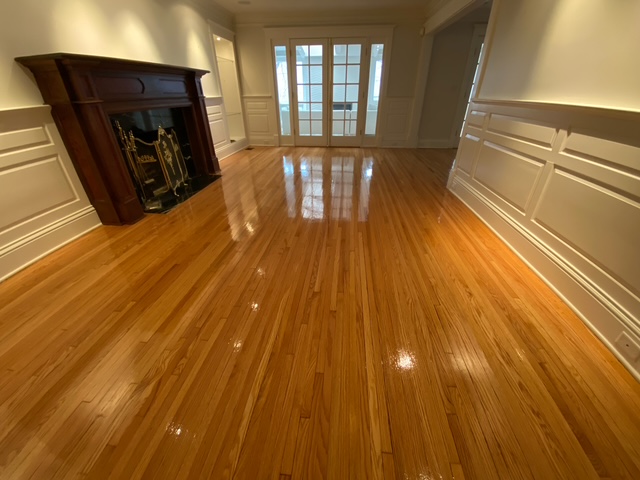How long do hardwood floors last?

How Long Do Hardwood Floors Last? Insights from Choice Hardwoods
As a homeowner, one of the most significant investments you’ll make is in your flooring. Hardwood floors, in particular, are often chosen for their timeless beauty, durability, and ability to add value to your home. But like any investment, it’s important to understand how long you can expect them to last, and what factors influence their longevity. At Choice Hardwoods, we are passionate about helping homeowners make informed decisions about their flooring, and we frequently get asked, “How long do hardwood floors last?”
The lifespan of hardwood floors can vary significantly based on several factors, such as the quality of the wood and finish, the amount of traffic the floors endure, the environment in which they’re installed, and how well they are maintained. Below, we will walk you through the various variables that impact the life expectancy of hardwood floors and explain how you can maximize the lifespan of your investment.
Factors That Impact the Lifespan of Hardwood Floors
1. Type of Hardwood Wood
The species of wood you choose plays a significant role in determining how long your hardwood floors will last. Different wood species have varying degrees of hardness, durability, and resistance to wear and tear. For example:
- Oak (particularly red oak) is one of the most popular hardwood choices because of its durability and ability to withstand heavy foot traffic. Oak floors can last 50 years or more if maintained well.
- Maple is another popular choice, known for its subtle grain pattern and strength. However, it is more prone to denting under heavy impacts compared to oak.
- Walnut is an elegant hardwood, but it’s softer than oak and can be more prone to scratches and dents.
- Cherry and mahogany offer beautiful aesthetics, but these woods are relatively softer and might not be the best for high-traffic areas.
The harder the wood, the longer it will last, but that’s not to say softer woods won’t last long. They just might show signs of wear faster.
2. Quality of the Finish
The finish applied to hardwood floors plays a vital role in protecting the wood and extending its lifespan. A good finish not only enhances the color and grain of the wood but also provides a protective layer that guards against scratches, stains, moisture, and UV damage.
There are several types of finishes commonly used for hardwood flooring:
- Oil-based polyurethane: Known for its durability and resistance to wear, oil-based polyurethane finishes can last 5 to 10 years with regular maintenance. These finishes tend to provide a warm, amber tone and are resistant to water damage.
- Water-based polyurethane: Offers a faster-drying, clear finish that doesn’t yellow over time. It’s durable, but slightly less resistant to scratches than oil-based finishes. Depending on the usage, water-based finishes may need to be reapplied every 3 to 5 years.
- Aluminum oxide finishes: Often found on prefinished hardwood floors, these finishes are incredibly hard and resistant to abrasion. Some can last as long as 25 years, even under high-traffic conditions.
- Penetrating oils: While they give the wood a natural, matte finish, they tend to need more frequent reapplication than other types of finishes.
The quality of the finish you choose, combined with how often you maintain and reapply the finish, can significantly impact the lifespan of your hardwood floors. A good quality finish will keep the wood protected and maintain its appearance for many years.
3. Amount of Foot Traffic
One of the most significant factors in determining how long hardwood floors will last is the amount of foot traffic they experience. High-traffic areas, such as hallways, living rooms, and kitchens, can wear down the finish and cause the wood to show signs of damage more quickly.
- Low traffic: If your hardwood floors are installed in low-traffic areas, such as bedrooms or formal dining rooms, they will likely last much longer without needing refinishing. Floors in these areas might retain their luster for decades before showing any real signs of wear.
- High traffic: In high-traffic areas, where people walk frequently, shuffle furniture, or where pets and children roam, the floors may begin to show visible signs of damage like scratches, scuffs, and dents after 10-15 years.
If your hardwood floors are subjected to heavy traffic, it’s important to maintain them regularly, apply additional coats of finish as needed, and consider protective mats or area rugs in high-traffic zones to preserve their longevity.
4. Climate and Environmental Conditions
The environment in which your hardwood floors are installed plays a major role in their lifespan. Temperature fluctuations, humidity levels, and the amount of moisture present in the air can affect the wood’s ability to expand and contract.
Humidity: Hardwood is a natural material, and it responds to changes in humidity. In areas with high humidity or wet climates, wood can expand and contract. Over time, this expansion and contraction can cause the boards to warp, gap, or buckle. In dry climates, hardwood floors may shrink, leading to gaps between the boards.
Temperature: Hardwood floors are sensitive to extreme temperature fluctuations. When installed in areas that experience drastic temperature changes, the wood can expand and contract, potentially damaging the finish or causing cracks in the wood.
Proper installation and regular maintenance of humidity levels (using humidifiers or dehumidifiers) will help mitigate these issues. Ideally, hardwood floors should be kept in an environment where temperatures range between 60-80°F and humidity levels are between 30-50%.
5. Maintenance and Care
Maintaining hardwood floors properly can greatly extend their lifespan. Regular cleaning, using appropriate products, and applying touch-ups as needed are all part of the upkeep.
- Regular Cleaning: Dust, dirt, and grit can act like sandpaper, scratching and dulling the surface of your hardwood floors. Sweeping or vacuuming regularly with a soft brush attachment will help keep your floors clean.
- Spills: Wipe up spills immediately to prevent moisture from seeping into the wood. This is especially important in high-moisture areas like kitchens or bathrooms.
- Refinishing: Over time, even with the best care, your hardwood floors will likely need to be refinished to restore their beauty. Refinishing involves sanding down the top layer of wood to remove surface damage and then reapplying a protective finish. This process can be done several times over the lifetime of the floor, helping to restore it and protect it from future damage.
How Long Can You Expect Hardwood Floors to Last?
Considering the factors mentioned above, a well-maintained hardwood floor can last anywhere from 30 to 100 years or more. Here’s a general breakdown based on the type of wood, finish, and maintenance:
- High-quality hardwood floors: With proper care, hardwood floors made of durable wood species (like oak or maple) with a good finish can last 50 years or more.
- Moderate traffic areas: If your hardwood is installed in bedrooms or other low-traffic areas, it can easily last 70-100 years.
- High-traffic areas: Floors in living rooms or hallways might need refinishing after 10-15 years to keep them looking new. With refinishing, they can last another 20-30 years.
When Should You Refinish Your Hardwood Floors?
Over time, even the toughest hardwood floors will start to show signs of wear, such as scratches, dents, or a dull finish. When the floor begins to look worn, refinishing is the best option to restore its beauty and extend its lifespan. Refinishing involves sanding down the surface to remove the old finish and any scratches, then applying a fresh coat of protective finish.
At Choice Hardwoods, we offer professional sanding and refinishing services to bring your hardwood floors back to life. Our expert technicians will restore your floors, ensuring they look as good as new. Refinishing can be done several times throughout the life of the floor—depending on the thickness of the hardwood—but eventually, if the wood is worn down too much, board replacement might be necessary.
Conclusion: Ensuring Your Hardwood Floors Last a Lifetime
So, how long do hardwood floors last? With the right care, maintenance, and installation, hardwood floors can last a lifetime. The key to maximizing the lifespan of your hardwood floors lies in understanding the factors that affect their longevity and taking steps to protect them.
Whether you need advice on choosing the right wood species, ensuring proper installation, or simply need help with maintenance, Choice Hardwoods is here to assist you. If your floors are starting to show signs of wear, don’t hesitate to reach out to us for professional sanding and refinishing services. We’re committed to helping you preserve the beauty and durability of your hardwood floors for years to come.

